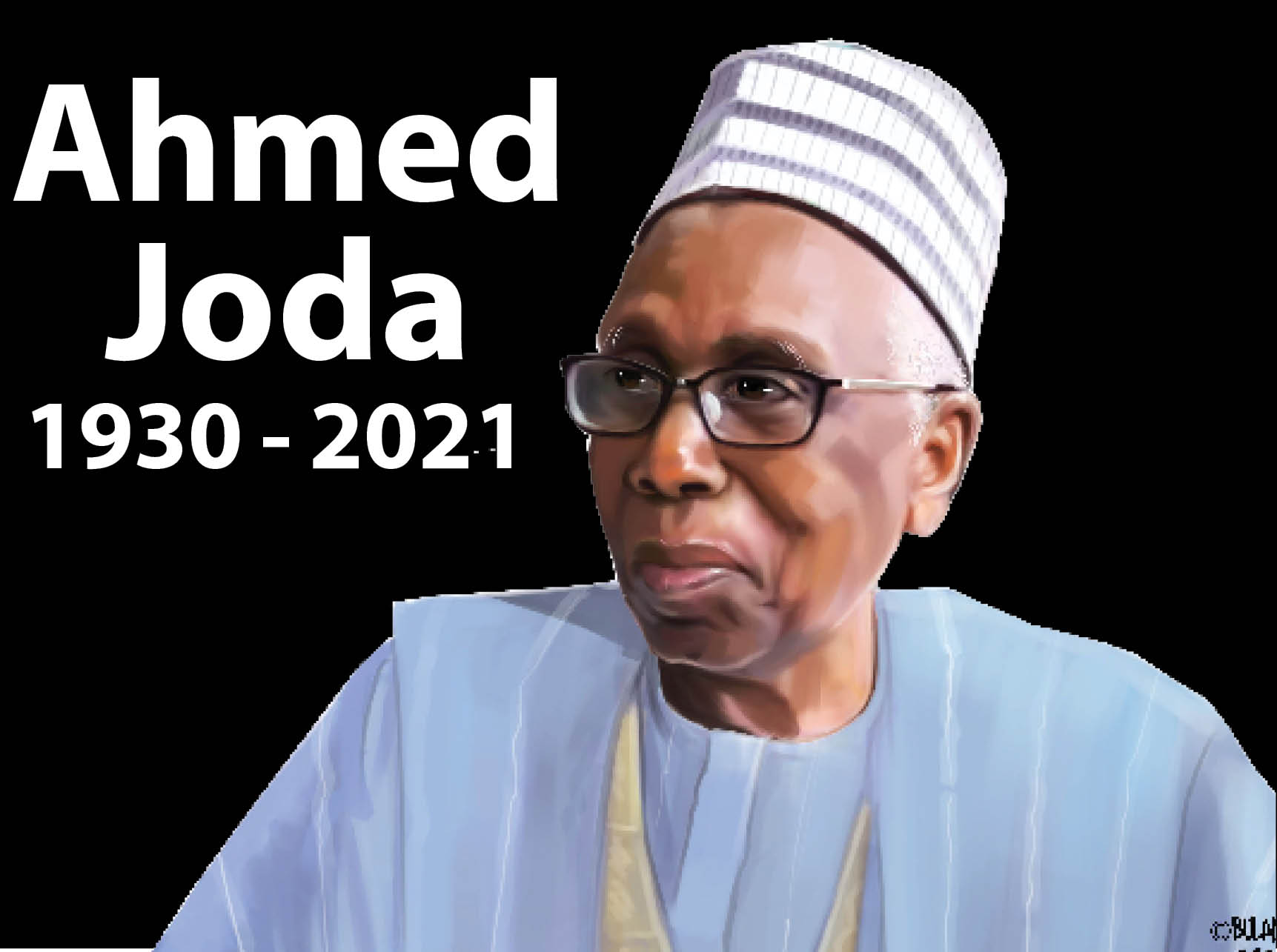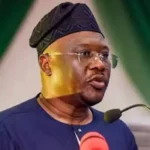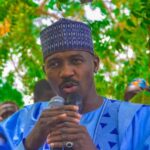Matthew Hassan Kukah
The death of Ahmed Joda marks the drop of the final leaves of the northern autumn. Ordinarily, in spring, the first drops of the rains and moisture breathe life into the foliage and in turn, a long process begins to ensure that fresh leaves return to the trees. However, with the bandits and kidnappers having taken over the region, Northern Nigeria is faced with a prospect of self- immolation that is almost impossible to contemplate.
The region’s internal tensions commenced long ago with the death of the Gamji himself on January 15th, 1966. His rarified personage had dwarfed all around him and there were hardly any pretending deputies in sight. Everyone around the Sardauna was merely an altar server; no co-celebrants as such. Credit must be given to the incredible resilience that enabled the northern acolytes to rally around and with no clear leader, assert northern dominance on the polity. These fixers were those who came under the pseudonym of the so called Kaduna mafia.
True or false, with Ahmed Joda gone, the north is at best now a huge graveyard. Its children are now largely orphans, with over ten million Almajiri street children, the highest levels of poverty, the highest levels of stunting, wasting and sick children and today, a turf for bandits, kidnappers, robbers and death.
I ‘met’ him over the years from a distance in the pantheon of the heroes and founders of northern Nigeria. While I had met some of his contemporaries such as Isa Kaita, Yahaya Gusau, Liman and Adamu Ciroma, Ahmed Talib, to mention a few, it was only in the late 90s that our paths finally crossed and we had a physical encounter that would lead to a long friendship. I was then Secretary General of the Catholic Secretariat of Nigeria.
I recall that in 1994, I attended a lecture at the National Institute for International Affairs. This event was the closest I got to meeting him formally for the first time and I seized the moment. I was emboldened by his physique and came to the conclusion that he was at least, we would level up easily. As I walked towards him, I was shocked when he beamed a smile and stretched his hand towards me. Fr. Kukah, so good to see you, he said, as I struggled to gain my composure. He then introduced me to his colleague, the late Alison Ayida (one of the Super Permanent Secretaries) who was beside him. Both greeted me with so much grace and composure. Here I was between two giants and almost having nothing to say as I listened to them acknowledge my contributions.
Alhaji Joda then turned and asked, so when will you come to my house? I literally shivered. He swiftly followed with, I live at Glover. It is not difficult to find. I nodded in awe, admiration and inspiration but quite nervous at my turn of fortune. I decided it would be better for me to strike while the iron was still hot. So, on Sunday that week, I turned up at his house without even a telephone call. I felt it would be enough for me to just leave a message that I had visited him.
He introduced me to his wife who in turn was so gracious and warm. I was quite taken aback that she also already knew me. Alhaji Joda spoke glowingly about his appreciation of my writings from the ‘New Nigerian’ days. He did most of the talking, while quite unlike me, I listened to his wealth of experience, agony and deep concern about the state of the country. I reluctantly took my leave after about two hours and two cups of tea. He escorted me to my car and let me know that I was welcome to his house anytime I wanted. Just know this is your house, he said as I entered my car.
We kept in regular contact one Friday evening, Alhaji Joda called me and asked, ‘Are you free over the weekend? I want us to go and watch a Polo game. It is a great game. Do you like it?’ I told him I knew the game existed but that I had never really watched the game.
Again, on the said day, Baba drove himself to the Catholic Secretariat to pick me. I was too timid to ask whether his driver had travelled. As we drove off, I kept wondering how this old man could drive around Lagos with such confidence. Given the rudeness of Lagos drivers, I wondered what if we hit someone or someone ran into us? How would I explain that this old man is the one driving me in Lagos traffic? I knew better than to ask. We got to the Polo Club ground in Ikoyi and the game had just started. We found our way to our seats.
Alhaji Joda was a class act and it was a great honour being in his company. I finished my time at the Secretariat, traveled out of the country after the Oputa Panel in 2001 and returned to Kaduna three years later in 2004. We reconnected almost immediately in Kaduna. One day, he invited me over to what looked like a new house that he was moving into on Sultan Road. At this time, I was not sure what to make of our relationship. Here was I, a small player in the league and this top gun of Nigeria’s bureaucratic elite was treating me as if we were some kind of mates. Neither his age, prestige nor place on the ladder of national life deemed. In his presence, you felt as if you were speaking to a close friend. As usual, we chatted about the country. Then he gently said to me: I wish to ask you for a favour and I hope you will accept. I would like you to join the national Board of our Association, Miyetti Allah. It is a misunderstood body and in reality, it is open to people who are not even Fulani but who have cattle. My jaw dropped. Me? How is that possible, I said to him, I do not speak Fulfulde and have never owned a cow. Your friend, President Obasanjo has cows and he would fit that kind of a role, I said in protest. Well, he responded: I have informed you and I will get the forms for you to fill. It is a harmless group, but we need to diversify it, he repeated. Unfortunately, I did not warm up to this proposal and somehow, the matter died.
Alhaji Joda always reminded me of how well he thought I had done at the Oputa Panel and other presidential initiatives. In one of our discussions, I told him that I had decided to set up a Think tank as a means of putting into practice my personal experiences in Church and state matters. He was genuinely delighted and said he was ready to support me. He asked me for the location and I told him I still had not found an office yet. He immediately said, ‘I have a house on Maiduguri Road off Constitution Road and you have can have it. I am not using it but you have use it for as long as you want. He went into his room and came back with a bunch of keys. Here, take these keys. Awestruck, I collected the keys literally trembling in disbelief. A few days later, I went to see the house on Maiduguri Road. It was the kind of place we were looking for, a three bedroom flat with an open courtyard. Unfortunately, my work at the National Political Reform Conference and then in Ogoniland all stretched and I did not have the time to really get started with the Centre. I returned the keys to him with apologies after almost a year!
All along, I really did not know how to address Alhaji Joda. As the years rolled by, I always called him Baba mai ran karfe. When I was appointed Bishop of Sokoto, he called to congratulate me. I informed him of the ordination more out of courtesy than an expectation that he would show up. He did not come and I more of less left it at that. However, barely three days after my ordination, I had just had breakfast when I was told that Alhaji Joda was in our premises. He had traced my house. I hurried outside and found him with another gentleman. I welcomed them in and they had barely sat down when he said to me, I want to once again congratulate you on your well-deserved appointment and to extend my best wishes to you. I am so sorry I could not be here physically, but I have to come to pay my respects. I came in from Kaduna yesterday and decided to see you this morning. I am so glad about your appointment and I believe that you and His Eminence can help foster peace among our people. He turned to the gentleman who came with him and introduced him me as Alhaji Aliyu Dankani, Chairman of Dankani Hotel. I have already told him, if you need anything, please go to him. He rose and I led him to his car as we bade goodbye. The thoughts that Baba Joda had travelled all the way by road from Kaduna just to come and congratulate me and wish me well filled me with deep emotions. It was the measure of a near perfect gentleman.
In 2012 I was invited by the American University, Yola to deliver their Convocation lecture and to be conferred with an honorary Doctorate degree that year. I was quite pleased but did not know that it was a prelude to other things. I would later be invited to join its Governing Council with Alhaji Joda as Chairman. Barely two years into my term, he stepped aside from the Board. He did not say much as to why. I suspected that he may have been responsible for my being a Member of the board.
Amidst the euphoria of the 2015 election victory of Major General Buhari (rtd), Alhaji Joda put a call to me when he was made Chairman of the Transition Committee. We exchanged pleasantries and he went straight to the point: I want you to please come and address the Members of the Transition Committee. When I asked what I was expected to speak on, he jokingly said, you are no stranger to the issues bedeviling our dear country, so please do us the honour. Just speak about anything you feel the new government should focus on. There is no way I could say no to him. I obliged, bearing in mind that I had also addressed almost every Transition Committee from that chaired by General T. Y Danjuma in 1999. I took note of his frustrations as the wheels of enthusiasm began to wobble by the second year of the administration. Once or twice when I tried to ask him how he felt about the government, he merely shook his head in pain. I never asked him again.
Alhaji Joda was a near perfect patriot. He loved the country and sacrificed for it, but it was sad to watch his frustration with the way things turned out. For a man who made so much sacrifice both for the region and the nation, he must have gone to his grave a very unhappy man about the state of the country. Whenever I could not reach him, I had always turned to his daughter Asmau. She had always been my sounding board. More and more, and in response to my questions as to where Baba was since reaching him had become a challenge, it was always, Baba yana gona. The farm had become his centre of gravity, his retreat and source of solace. Alhaji Joda more than paid his dues. His family should be proud that they had a patriarch of such impeccable character and grace. I was blessed that he counted me worthy of his company. Meanwhile, we look at the foliage in northern Nigeria with trepidation and wonder, will the trees ever bear any green leaves again? Who will water them now that the last of the gardeners is gone? May God grant eternal bliss to a quintessential, Mutumin kirki.
Kukah is the Bishop of the Catholic Diocese of Sokoto

 Join Daily Trust WhatsApp Community For Quick Access To News and Happenings Around You.
Join Daily Trust WhatsApp Community For Quick Access To News and Happenings Around You.


